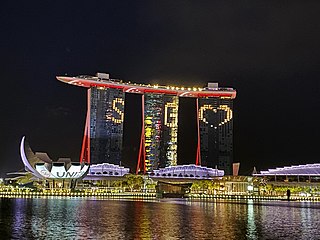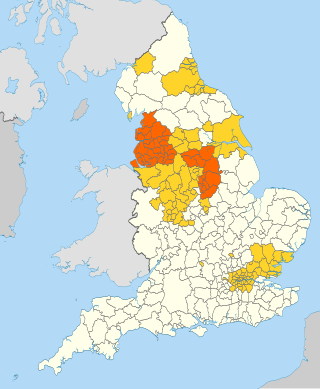
During the COVID-19 pandemic, many countries and regions imposed quarantines, entry bans, or other travel restrictions for citizens of or recent travelers to the most affected areas. Some countries and regions imposed global restrictions that apply to all foreign countries and territories, or prevent their own citizens from travelling overseas.

The Health Protection (England) Regulations 2020, informally known as "the Lockdown Regulations", was a statutory instrument (SI) enacted on 26 March 2020 by the Secretary of State for Health and Social Care, Matt Hancock, in response to the COVID-19 pandemic. It became the principal delegated English legislation restricting freedom of movement, gatherings, and business closures during the COVID-19 emergency period until its revocation by The Health Protection (England) Regulations 2020 on 4 July 2020.

The 2020–21 Singapore circuit breaker measures were a stay-at-home order and cordon sanitaire implemented as a preventive measure by the Government of Singapore in response to the COVID-19 pandemic in the country on 7 April 2020.

The Health Protection (England) Regulations 2020 is a statutory instrument (SI) enacted on 21 March 2020 by the Secretary of State for Health and Social Care, Matt Hancock, in response to the COVID-19 pandemic. It enforced the closure in England of businesses selling food and drink for consumption on the premises, as well as a range of other businesses such as nightclubs and indoor leisure centres where a high risk of infection could be expected.

The Health Protection (England) Regulations 2020 is a statutory instrument (SI) brought into force on 15 June 2020 by the Secretary of State for Transport, Grant Shapps, in response to the COVID-19 pandemic. The regulations required the wearing of a face covering when travelling on public transport such as trains, buses and aircraft in England, later extended to include taxis and private hire vehicles. The regulations were revoked on 18 July 2021.

The Health Protection (England) Regulations 2020 is a statutory instrument (SI) enacted on 4 July 2020 by the Secretary of State for Health and Social Care, Matt Hancock, in response to the COVID-19 pandemic. It replaced and relaxed the previous Lockdown Regulations, and gave the Secretary of State powers to make declarations restricting access to public outdoor places.

The Health Protection (England) Regulations 2020 is a statutory instrument (SI) enacted on 18 July 2020 by the Secretary of State for Health and Social Care, Matt Hancock, in response to the COVID-19 pandemic. It allowed a local authority to make directions relating to premises, events and outdoor public spaces in its area, supplementing central government powers relating to public outdoor places that were granted to the Secretary of State on 3 July in The Health Protection (England) Regulations 2020. In practice, the regulations allowed local authorities to close shops and outdoor public spaces, and to cancel events. The regulations related to England only.

The Health Protection (England) Regulations 2020 is a statutory instrument (SI) brought into force on 23 July 2020 by the Secretary of State for Health and Social Care, Matt Hancock, in response to the COVID-19 pandemic. Subject to some exceptions, it required members of the public in England to wear a face covering in most indoor shops, shopping centres, banks, post offices and public transport hubs. The regulations were similar to the Health Protection (England) Regulations 2020, which were brought into force on 15 June 2020. The regulations were revoked on 18 July 2021, five days before they would otherwise have expired.

During the COVID-19 pandemic, a variety of lockdown regulations were enforced in England by way of statutory instrument. Most covered the whole country, but some focused on local areas of particular concern. Leicester was the first area to be subject to local restrictions, on 4 July 2020, and many other regions were added over the subsequent three months.

The Health Protection (England) Regulations 2020 is a statutory instrument (SI) made on 2 June 2020 by the Secretary of State for Health and Social Care, Matt Hancock, in response to the COVID-19 pandemic. The regulations aimed to reduce the possibility of infection spreading from travellers from overseas. They imposed requirements from 8 June 2020 on certain categories of travellers arriving in England from outside the Common Travel Area. Travellers falling within the regulations had to provide specified information on entry, and some had to undergo a fourteen-day period of self-isolation.

The Health Protection (Self-Isolation) (England) Regulations 2020 is a statutory instrument (SI) made on 27 September 2020 by the Secretary of State for Health and Social Care, Matt Hancock, in response to the COVID-19 pandemic. They are sometimes referred to as the Self-Isolation Regulations.

On 14 October 2020, the UK Government abandoned its attempts to control the spread of SARS-CoV-2 by means of piecemeal local regulations and introduced a three-tier approach across England, with legal restrictions varying according to government-defined tiers. Tier 1 restrictions were referred to as 'Local COVID Alert Level Medium', with tier 2 being 'Local COVID Alert Level High' and tier 3 'Local COVID Alert Level Very High'. The restrictions were enforced by three English statutory instruments, as follows:

The Health Protection (England) Regulations 2020 is an English statutory instrument made on 3 November 2020 by the Secretary of State for Health and Social Care, Matt Hancock, in response to the COVID-19 pandemic.

The Health Protection (England) Regulations 2020 is an English emergency statutory instrument that replaced the second lockdown regulations from 2 December 2020. As initially made, it brought back the three-tier legal framework first introduced by the first COVID-19 tier regulations in England, but with changes to the restrictions within each tier. The regulations are sometimes referred as the "second tier regulations" or the "all tiers regulations".

The Health Protection (England) Regulations 2020 is an English statutory instrument that empowered local authority officers to issue legally-binding notices to anyone found to be contravening one of the emergency coronavirus provisions. Notices could require remedial action and the closure of premises. Failure to comply was an offence, and could be dealt with by the courts or by issuance of a fixed penalty notice.

The Health Protection (Steps) (England) Regulations 2021 is an English emergency statutory instrument which replaced the Health Protection (England) Regulations 2020 from 29 March 2021. Initially, all of England was subject to Step 1 restrictions. Step 2 applied from 12 April 2021 and Step 3 from 17 May 2021. The regulations were originally set to expire on 30 June 2021, but that was later extended to the end of 18 July 2021. They were revoked on the latter date.
Trials to assess the effectiveness of an immunity passport scheme, also known as a COVID passport or COVID certification scheme, were confirmed by the UK government on 3 April 2021 as a way of helping to restart public events in England during the COVID-19 pandemic. The announcement was made following much discussion and speculation about the idea by politicians and in the British media. The government announced that trials of a scheme for England would begin on 16 April, starting with a comedy evening in Liverpool.

The Health Protection (England) Regulations 2021 is a statutory instrument (SI) made on 14 May 2021 by the Secretary of State for Health and Social Care, Matt Hancock, in response to the COVID-19 pandemic. The regulations aimed to reduce the possibility of infection spreading from travellers from overseas. They revoked and replaced the Health Protection (England) Regulations 2020, and introduced a new set of requirements for international travellers who arrived in England having begun their journey outside the Common Travel Area (CTA), as well as travellers arriving from within the CTA who had been outside the CTA in the 10 days preceding their arrival. Travellers arriving in England who had remained entirely within the CTA during the preceding 10 days were mostly not affected.

A vaccine passport or proof of vaccination is an immunity passport employed as a credential in countries and jurisdictions as part of efforts to control the COVID-19 pandemic via vaccination. A vaccine passport is typically issued by a government or health authority, and usually consists of a digital or printed record. Some credentials may include a scannable QR code, which can also be provisioned via mobile app. It may or may not use a COVID-19 vaccine card as a basis of authentication.

The Health Protection (England) Regulations 2021 (SI 2021/1340) is a statutory instrument (SI) made by the Secretary of State for Health and Social Care in response to the Omicron variant during the COVID-19 pandemic. The regulations were similar to previous face covering regulations that had been revoked in July 2021. Subject to some exceptions, they required members of the public in England to wear a face covering on public transport and in most indoor shops between 30 November 2021 and 26 January 2022.






